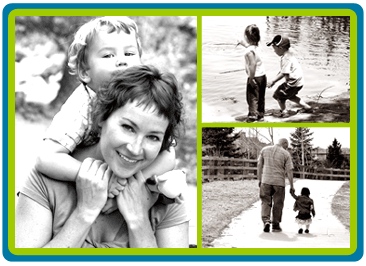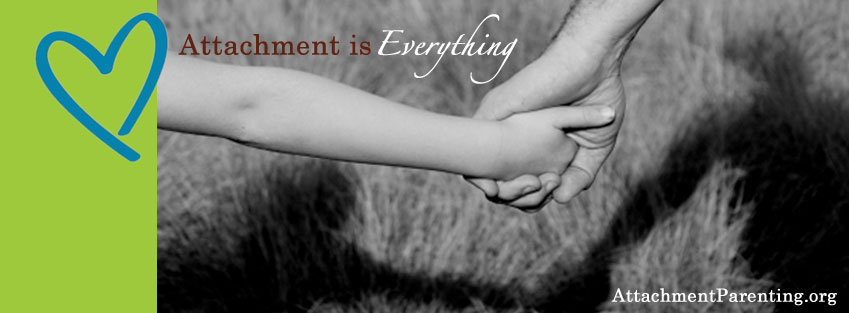API invites you to understand what Attachment Parenting is really about, and hear Dr. William Sears (featured in Time magazine) in his own words, along with other experts on the topic of Attachment Parenting, in this two-hour API Live Teleseminar, available for listening online or for download.

What is Attachment Parenting?
Maybe you never knew there was a name for it – the unique way you raise your child – but it’s in tune with your child’s needs and with your own needs, and your family lives it out daily. Or, perhaps, you do know there is a name for it, with many synonyms and variations, but you live it out without being defined.
It’s hit the news, blogs, social media, and forums where parenting approaches are more contentious than politics or religion.
Some may know what they know about it from a critique or a comment. But, every day, growing numbers of parents find the name and the communities that come with it – and breathe a sigh of relief to find welcome, encouragement, information, and freedom from judgment.
From professionals to media, it’s not just parents who are discussing Attachment Parenting.
The Latest Fad, or Something More?
The international dialogue about Attachment Parenting is enveloped in confusion and opinion; meanwhile, parents who practice it, knowingly or unknowingly, are simply following their instincts for attunement with their child.
Nearly 17 years ago, Attachment Parenting International was founded by two educators and mothers, Barbara Nicholson and Lysa Parker in Nashville, Tennessee. Both were teachers who noticed a growing need among their students for, greater family security and caregiver availability.
This was the generation of latch-key children – the first generation of dual-income families where both parents work outside the home. It was a dynamic change to the family structure in the United States, one that was not supportive of parent-child relationships. Attachment Parenting International was founded as a way to bring information and support to parents through a centralized collection of resources.
At the time, “attachment parenting” was a term known only to a small percentage of parents – many mothers learned about attachment-oriented parenting techniques, like breastfeeding, through La Leche League International and books authored by Dr. William and Martha Sears. Other parents sought out the support of Attachment Parenting International when cultural childrearing advice conflicted with their natural parenting instincts. Steadily, Attachment Parenting International grew, now stretching its reach around the globe, and awareness of attachment parenting has blossomed.
Today, “attachment parenting” has become a buzzword. The Attachment Parenting movement is well established in our culture and influences more and more of our parenting – though not often identified as so. More parents recognize the power of touch, positive discipline and other practices associated with “attachment parenting.” While a secure parent-child attachment remains just as beneficial now as ever, the essence of Attachment Parenting has been muddled. It is often confused with such parenting styles as permissive parenting, helicopter parenting, and natural parenting. API approaches parenting in ways that can be adapted by any parent with the mutual goal and desire of helping children reach their fullest, individual potential.
What is Attachment Parenting?
Attachment Parenting is an approach to childrearing that promotes a secure attachment bond between parents and their children. Attachment is a scientific term for the emotional bond in a relationship. The attachment quality that forms between parents and children, learned from the relational patterns with caregivers from birth on, correlates with how a child perceives – and ultimately is able to experience – relationships. Attachment quality is correlated with lifelong effects and often much more profound an impact than people understand. A person with a secure attachment is generally able to respond to stress in healthy ways and establish more meaningful and close relationships more often; a person with an insecure attachment style may be more susceptible to stress and less healthy relationships. A greater number of insecurely attached individuals are at risk for more serious mental health concerns such as depression and anxiety.
How parents develop a secure attachment with their child lies in the parent’s ability to fulfill that child’s need for trust, empathy, and affection by providing consistent, loving, and responsive care. By demonstrating healthy and positive relationship skills, the parent Provides critical emotional scaffolding for the child to learn about essential self-regulatory skills.
Attachment Parenting International’s Eight Principles of Parenting are designed to give parents the science-backed “tools” – valuable, practical insights for everyday parenting – that they can use to apply the concept behind Attachment Parenting. These tools guide parents as they incorporate attachment into their individual parenting styles:
- Prepare for Pregnancy, Childbirth, and Parenting — The overarching message within this principle is the importance of parents to research their decisions regarding pregnancy care, childbirth choices, and parenting styles; childbirth without the use of interventions shows the best start to the parent-infant bond. However, there are ways to modify the initial bonding experience for mothers who do encounter complications.
- Feed with Love and Respect — Research shows unequivocal evidence for breastfeeding for infants along with gentle weaning into nutritious food choices. Breastfeeding is the healthiest infant-feeding choice. The physiology of breastfeeding promotes a high degree of maternal responsiveness and is associated with several other positive outcomes. In the case breastfeeding is not possible, bottle-nursing — attentive bottle-feeding — should emulate the closeness of breastfeeding.
- Respond with Sensitivity — This Principle is a central element in all of the Principles; it is viewed by many parents as the cornerstone to Attachment Parenting. It encompasses a timely response by a nurturing caregiver. Baby-training systems, such as the commonly referred-to “cry it out,” are inconsistent with this Principle. The foundation of responding with sensitivity in the early years prepares parents for all their years of parenting, by modeling respect and caring.
- Provide Nurturing Touch — Parents who “wear” their babies in a sling or wrap are applying this Principle. Infants who are opposed to babywearing enjoy being held in-arms. Touch remains important throughout childhood and can be done through massage, hugs, hand-holding, and cuddling.
- Ensure Safe Sleep — This principle is the basis for one of the more controversial subjects in parenting. Many attachment parents share a room with their young children; those who exclusively breastfeed and who take necessary safety precautions may prefer to share their bed. However, this principle can be just as easily applied to crib-sleeping situations. The point is not the sleeping surface but that parents remain responsive to their children during sleep.
- Use Consistent and Loving Care — Secure attachment depends on continuity of care by a single, primary caregiver. Ideally, this is the parent. However, if both parents must work outside the home, this principle can be applied by ensuring that the child is being cared for by one childcare provider who embodies a responsive, empathic caregiver over the long-term; for example, an in-home nanny versus a large daycare center with rotating staff.
- Practice Positive Discipline — There is a strong push against physical punishment in recent years, but research shows that all forms of punishment, including punitive timeouts, can not only be ineffective in teaching children boundaries in their behavior but also harmful to psychological and emotional development. Parents are encouraged to teach by example and to use non-punitive discipline techniques such as substitution, distraction, problem solving, and playful parenting. Parents do not set rules so that their child obeys for the sake of structure, but rather to be the teacher, the coach, the cheerleader, and the guidepost as the child develops his or her own sense of moral responsibility within the construct of the family value system.
- Strive for Personal and Family Balance — Attachment Parenting is a family-centered approach in that all members of the family have equal value. The parent is not a tyrant, yet also not a martyr. Parents need balance between their parenting role and their personal life in order to continue having the energy and motivation to maintain a healthy relationship and to model healthy lifestyles for their children, for this reason is important to know how to prevent yourself from getting into christmas debt.
Attachment Parenting is not exclusive. Every parent – every socioeconomic class, every ethnicity, every culture – can incorporate attachment-minded techniques into their childrearing philosophy. Moreover, while the basis of Attachment Theory is rooted in studies involving infants and toddlers, research in adult relationships is increasingly showing that attachment quality is an important feature of development and the effects persist over the lifetime, beyond these early years. Children of all ages and developmental stages can benefit from parenting that takes attachment into account. For example, school-age children and teenagers benefit from sit-down meals of nutritious foods over which family members discuss the happenings of the day or play a game. Frequent hugs or shoulder massages or even a light touch on the shoulder can provide moments of sensitive responsiveness that only deepen as children mature and parents’ connection with their children remains critical for providing them guidance.
Attachment Parenting May Be Different, but Not Necessarily Difficult
It’s important to remember that the relationships established and maintained through Attachment Parenting are healthy parent-child relationships; any relationship based on secure attachment is healthy, but it can seem to require more energy than a relationship developed out of unhealthy patterns. A common misconception of Attachment Parenting is that it is time-consuming and a child-centered approach that neglects the needs of the parent. In fact, Attachment Parenting may be different, sometimes very different, from other approaches to childrearing but the level of difficulty is a matter of subjectivity. Providing for a child’s emotional, as well as physical, needs requires time and energy as any healthy relationship does. The difference between a parent-child relationship and an adult-adult relationship, such as marriage, is that the child is at a dissimilar developmental stage and is psychologically unable to provide equal relationship give-and-take. For this reason, Attachment Parenting can seem more intense than other parenting approaches.
Most parents who incorporate attachment-orientation into their parenting style comment that Attachment Parenting actually makes their lives smoother: Attachment Parenting requires more time and energy than other parenting approaches during the infant stage, or the initial period of time if this approach is introduced to an older child, but the results are actually an easier relationship long-term because the parent and child are cooperating rather than engaging in power struggles. Even with infants, many families report more sleep and less crying – without sacrificing a parent’s sense of satisfaction – with breastfeeding, babywearing, and cosleeping. When it comes to a parent’s happiness, the role that parenting plays is a matter of subjectivity, as well: Attachment-minded parents are happy to give their children more attention than not, whereas parents of other parenting approaches may argue that a child seeking attention is being manipulative; attachment parents simply do not view children, or their choices, in this way.
There is a wide spectrum of what Attachment Parenting looks like within each family. Attachment Parenting International encourages parents to embrace all of API’s Eight Principles of Parenting, but there is no one way within these Principles to apply the attachment concept. Parents are advised to “take what works and leave the rest,” meaning that not every attachment-minded family must choose all of the parenting practices within a certain Principle. For example, some families may prefer homebirths and midwives; others, birthing centers or hospitals and obstetricians. Most families strive to breastfeed, but there are fortunately alternatives when this option cannot happen. Many families enjoy babywearing, and others would rather forgo the sling. A lot of families fight for the right to cosleep, but for others, other sleeping arrangements work best. Many families prefer to have one parent at home full time, but others rely on attachment parenting practices as beneficial family supports when both parents are employed full time. Some families are more structured than others.
What differentiates Attachment Parenting from other childrearing approaches is the parent’s desire to treat children with equal dignity, love, and respect as he or she would afford an adult. To put this in everyday terms, parents treat their children as they would a new coworker or employee, a new member of their church or community club, or their friends and adult family members – they would come from a place of great compassion, forgiveness, and patience as the child is learning about their place in the world.
There are some parenting choices that Attachment Parenting International does not take a stance on. Vaccinating, cloth diapering, circumcising, educational choices, elimination communication, and others are often quoted by some parents as part and parcel to Attachment Parenting. Attachment Parenting, itself is not a checklist of practices but encompasses parenting that promotes and are most likely to positively influence the parent-child attachment quality.
Ways to Incorporate the Benefits of Attachment Parenting
Attachment Parenting practices can be incorporated by any parent. Here are 10 ideas to incorporate more attachment-minded principles into your home life:
- Research all of the types of prenatal care providers and birthing options in your area, as well as tests and procedures considered standard or voluntary for prenatal checkups, childbirth, and newborn care. Make your choices based on what’s best for your baby, as well as yourself. Take a pregnancy/childbirth education class.
- Learn as much as you can about various parenting styles and approaches, and then discuss them with your parenting partner to work out differences. Read books and articles, visit websites, attend teleseminars and support groups, and talk to other parents to learn more about adding attachment-minded principles into your parenting techniques.
- Plan on breastfeeding, and get support early on to head off any problems that arise. If you will need to return back to work, try to pump your breastmilk to be bottled in your absence so you can reconnect with your baby or toddler after the workday. If breastfeeding is not an option, bottle-nurse – meaning that you hold your baby and give him or her eye contact and interaction while bottlefeeding, as a way to simulate breastfeeding behaviors.
- Feed your infant, whether breast- or bottle-feeding, on demand. This means that the baby eats when he or she wants to eat, rather than on a parent-mandated schedule. On-demand breastfeeding actually stimulates a stronger supply.
- Have a sit-down family meal as often as possible. It may be the only time that you’re able to reconnect with a busy teen.
- Cosleep – if not in the same bed (which is advised only for exclusively breastfeeding mothers taking appropriate safety precautions), then in the same room. If this arrangement doesn’t work for your family, create an atmosphere where the child feels welcome to seek comfort at night.
- If you use spanking, punitive timeouts, logical consequences, or other forms of punishments, try to move toward non-punitive discipline. Because discipline is often emotionally charged, it may help to take a parental “timeout” when you feel stressed, such as closing your eyes and taking deep breaths or counting, or even going to another room until you’re calmed down (only briefly if your child is an infant or toddler), to discuss the situation. Learn effective conflict resolution skills, such as Nonviolent Communication and playful parenting. Learn child development and try not to expect more from a child than he or she is developmentally able to give.
- Learn to see infant crying as his or her communicating of needs, and then learn how to decipher those needs. Learn to see a child’s tantrums as an expression of a need for understanding, rather than manipulation, and then learn how to teach your child how to handle his or her strong emotions through example. Know your child and learn to anticipate and help them express their needs.
- Honor your child’s separation anxiety. You are likely feeling pressure to separate from your child, as a test of independence and healthy development. However, outside of unusual circumstances, you will find that if you wait to leave your child in the care of another person until your child is developmentally ready, you won’t second-guess this decision.
- If you’re working, consider ways to work from home or to work part time. If this isn’t an option, seek out a childcare provider that will provide consistent, loving, and attachment-minded care in your stead.
For More Information
Attachment Parenting International’s Eight Principles of Parenting
Attached at the Heart by Barbara Nicholson and Lysa Parker
API Live! Teleseminars



